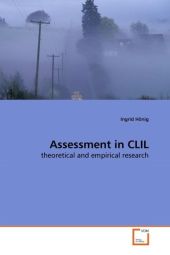 Neuerscheinungen 2010Stand: 2020-01-07 |
Schnellsuche
ISBN/Stichwort/Autor
|
Herderstraße 10
10625 Berlin
Tel.: 030 315 714 16
Fax 030 315 714 14
info@buchspektrum.de |

Ingrid Hönig
Assessment in CLIL
theoretical and empirical research
2010. 112 S. 220 mm
Verlag/Jahr: VDM VERLAG DR. MÜLLER 2010
ISBN: 3-639-26268-9 (3639262689)
Neue ISBN: 978-3-639-26268-1 (9783639262681)
Preis und Lieferzeit: Bitte klicken
As an English teacher in adult education, I have noted differing behaviours in my learners in recent years: those having undergone some kind of CLIL instruction speak more self-confidently and naturally, which they account for by referring to the Austrian principle of not assessing CLIL students on the L2. This explanation prompted me to research in my English studies at Vienna University how assessment is carried out in CLIL, in particular to explore the role L2 language proficiency plays in assessment. My most significant finding was that, in spite of teachers´ assertions to the contrary, they did assess language proficiency and even used it as a major criterion in grading students. As my study further shows, traditional methods of assessment such as oral exams do not do CLIL students´ achievements justice. Alternative instruments are required. Devising these, however, would call for formal agreement on language criteria as well as on the weighting of content and language in exams.
Ingrid Hönig, Magistra der Philosophie. English teacher in adult education (EFL, ESP). English studies at Vienna University. Research: assessment in CLIL.


